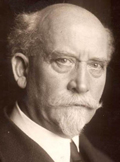 |
Philipp Heinrich Scheidemann
b. 26 Jul 1865, Kassel, Hesse-Kassel
d. 29 Nov 1939, Copenhagen, Denmark |
| Title: |
Präsident des Reichsministeriums (President of the Reich Government) |
| Term: |
13 Feb 1919 - 21 Jun 1919 |
| Chronology: |
13 Feb 1919,
appointed, order issued by the Reich President on 13 Feb 1919 [1] |
| |
19 Jun 1919, resignation submitted to the Reich President, accepted pending the appointment of a successor [2] |
| |
21 Jun 1919,
discharged, order issued by the Reich President on
21 Jun 1919 [3] |
| Names/titles: |
Volksbeauftragter (People's Commissioner) [29 Dec 1918 - 11 Feb 1919] (see details) |
| Biography: |
| Worked as typesetter and proofreader in Kassel; joined the Social Democratic Party (Sozialdemokratische Partei Deutschlands, SPD) in 1883; edited social democratic newspapers in Gießen, Nürnberg, Offenbach and Kassel (1895-1905); was elected a member of the Reichstag for Düsseldorf (1903-1919) and joined the majority of his party in supporting Germany's participation in World War I; served as a deputy of municipal council in Kassel (1906-1911); was promoted to the position of secretary in the SPD executive board (1911); headed the party faction in the Reichstag in 1913-1918 (with Hugo Haase); after the split with the independent social democrats (Unabhängige Sozialdemokratische Partei Deutschlands, USPD), he was elected to the SPD executive board; appointed minister without portfolio (Oct 1918 - 9 Nov 1918) in the last imperial cabinet of Maximilian Prinz von Baden; following the announcement about the abdication of Emperor Wilhelm II (9 Nov 1918), addressed the people from the balcony of the Reichstag with a famous speech, in which he proclaimed a German republic; according to the agreement between SPD and USPD (10 Nov 1918), entered the Council of People's Commissioners (Rat der Volksbeauftragten) with responsibility for finance; subsequent to the departure of USPD members on 29 Dec 1918, he was approved (30 Dec 1918) as co-chairman of the Council (with Friedrich Ebert); was entrusted to form the first government of the Weimar republic (11 Feb 1919) and appointed President of the Reich Ministry (13 Feb 1919); formed the Cabinet of SPD, Democratic Party (Deutsche Demokratische Partei), and the German Centre Party (Deutsche Zentrumspartei, commonly known as Zentrum); the government existed for less than five months and collapsed before the National Assembly approved new constitution of the German Reich; resigned in protest over the Treaty of Versailles; served as a member of the SPD executive board (1919) and then assumed the office of mayor of Kassel (1920-1925); was elected to the Reichstag from the Hessen-Nassau constituency (1920-1933); survived the attempt of assassination (4 Jun 1922); with the rise of Nazism, he emigrated from Germany (1933) and died in exile in Denmark. |
| Biographical sources: "Philipp Scheidemann. Gedächtnis und Erinnerung", by Christian Gellinek (Waxmann, 2006). |
| |
| [1] |
Bundesarchiv, R 43 I/3425, fl. 7. |
| [2] |
Akten der Reichskanzlei: Weimarer Republik. Das Kabinett Scheidemann (Boppard am Rhein: Boldt, 1971), S. LXI-LXII: "Am Abend, gegen 21 Uhr 30, begann dann die entscheidende Sitzung des Kabinetts, <...> gegen Mitternacht die Sitzung beendete, den Reichspräsidenten aufsuchte und, gemeinsam mit Brockdorff-Rantzau und Landsberg, seine Demission anzeigte."; S. 502-503: "Nr. 118 Geheime Aufzeichnung des Reichsministers des Auswärtigen über die Kabinettssitzungen in Weimar am 18. und 19. Juni 1919. 2. Juli 1919: <...> Um ½10 Uhr [19. 6. abends] fand eine Sitzung der Mehrheitsparteien statt, in deren Verlauf besonders Professor Schücking außerordentlich energisch für die Ablehnung des Friedensvertrages eintrat. Da die Diskussion drohte, ins Uferlose zu gehen, weil die einzelnen Parteimitglieder alle schon zehnmal erörterten Argumente anführten, fragte Scheidemann mich, ob ich bereit sei, mit ihm sofort meine Demission einzureichen, um dieser frucht- und sinnlosen Debatte ein Ende zu machen. Ich erklärte mich ebenso wie der Minister Landsberg unverzüglich einverstanden. Die Sitzung wurde darauf geschlossen und dem Reichspräsidenten von der Demission des Kabinetts Meldung erstattet." |
| [3] |
Bundesarchiv, R 43 I/3425, fl. 53. |